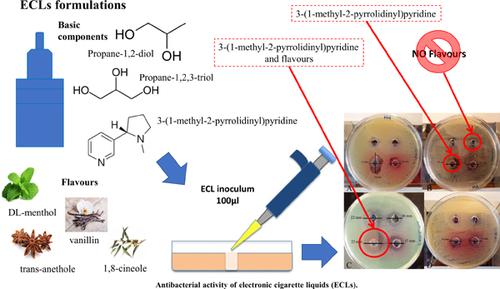Current Pharmaceutical Biotechnology ( IF 2.2 ) Pub Date : 2021-05-31 , DOI: 10.2174/1389201021666200903121624 Virginia Fuochi 1 , Massimo Caruso 1 , Rosalia Emma 1 , Aldo Stivala 1 , Riccardo Polosa 2 , Alfio Distefano 1 , Pio M Furneri 1

|
Background: The key ingredients of e-cigarettes liquid are commonly propane-1,2-diol (also called propylene glycol) and propane-1,2,3-triol (vegetal glycerol) and their antimicrobial effects are already established. The nicotine and flavors which are often present in e-liquids can interfere with the growth of some microorganisms. Objective: The effect of combining these elements in e-liquids is unknown. The aim of the study was to investigate the possible effects of these liquids on bacterial growth in the presence or absence of nicotine and flavors.
Methods: Susceptibilities of pathogenic strains (Klebsiella pneumoniae, Staphylococcus aureus, Pseudomonas aeruginosa, Acinetobacter baumannii, Escherichia coli, Enterococcus faecalis and Sarcina lutea) were studied by means of a multidisciplinary approach. Cell viability and antioxidant assays were also evaluated.
Results: All e-liquids investigated showed antibacterial activity against at least one pathogenic strain. Higher activity was correlated to the presence of flavors and nicotine.
Discussion: In most cases, the value of minimal bactericidal concentration is equal to the value of minimal inhibitory concentration showing that these substances have a bactericidal effect. This effect was observed in concentrations up to 6.25% v/v. Antioxidant activity was also correlated to the presence of flavors. Over time, the viability assay in human epithelial lung A549 cells showed a dose-dependent inhibition of cell growth.
Conclusion: Our results have shown that flavors considerably enhance the antibacterial activity of propane-1,2-diol and propane-1,2,3-triol. This study provides important evidence that should be taken into consideration in further investigative approaches, to clarify the different sensitivity of the various bacterial species to e-liquids, including the respiratory microbiota, to highlight the possible role of flavors and nicotine.
中文翻译:

电子烟液 (ECL) 抗菌活性的研究:概念研究的证明
背景:电子烟液的主要成分通常是丙烷-1,2-二醇(也称为丙二醇)和丙烷-1,2,3-三醇(植物甘油),它们的抗菌作用已经确立。电子烟油中经常存在的尼古丁和香料会干扰某些微生物的生长。目的:在电子烟油中结合这些元素的效果尚不清楚。该研究的目的是研究这些液体在存在或不存在尼古丁和香料的情况下对细菌生长的可能影响。
方法:通过多学科方法研究致病菌株(肺炎克雷伯菌、金黄色葡萄球菌、铜绿假单胞菌、鲍曼不动杆菌、大肠杆菌、粪肠球菌和黄斑马鞭草)的敏感性。还评估了细胞活力和抗氧化测定。
结果:所有被调查的电子烟油都显示出对至少一种致病菌株的抗菌活性。较高的活性与香料和尼古丁的存在相关。
讨论:在大多数情况下,最低杀菌浓度值等于最低抑菌浓度值,说明这些物质具有杀菌作用。这种效应在高达 6.25% v/v 的浓度下观察到。抗氧化活性也与风味的存在相关。随着时间的推移,人肺上皮 A549 细胞的活力测定显示细胞生长的剂量依赖性抑制。
结论:我们的结果表明,调味剂可显着增强丙烷-1,2-二醇和丙烷-1,2,3-三醇的抗菌活性。这项研究提供了在进一步调查方法中应考虑的重要证据,以阐明各种细菌物种对电子液体(包括呼吸道微生物群)的不同敏感性,以突出风味和尼古丁的可能作用。









































 京公网安备 11010802027423号
京公网安备 11010802027423号